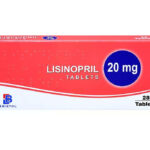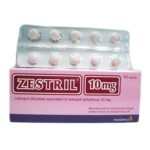How Long Does It Take For Lisinopril Side Effects To Go Away?

A side effect is usually regarded as an undesirable secondary effect that occurs in addition to the desired therapeutic effect of a drug or medication. Side effects may vary for each individual depending on the person’s disease state, age, weight, gender, ethnicity, and general health.
Side effects can occur when commencing, decreasing/increasing dosages, or ending a drug or medication regimen. Side effects may also lead to non-compliance with prescribed treatment. When side effects of a drug or medication are severe, the dosage may be adjusted or a second medication may be prescribed. Lifestyle or dietary changes may also help to minimize side effects.
Approximately one in three Americans have high blood pressure, but only about half of those who do have the condition under control. One common reason: they stop taking their medications, often because of troublesome side effects such as weakness, fatigue, or a dry cough.
What is Lisinopril?
Lisinopril is in a class of medications called angiotensin-converting enzyme (ACE) inhibitors. It works by decreasing certain chemicals that tighten the blood vessels, so blood flows more smoothly and the heart can pump blood more efficiently.
Lisinopril is used alone or in combination with other medications to treat high blood pressure in adults and children 6 years of age and older. It is used in combination with other medications to treat heart failure. Lisinopril is also used to improve survival after a heart attack.
High blood pressure is a common condition and when not treated, can cause damage to the brain, heart, blood vessels, kidneys, and other parts of the body. Damage to these organs may cause heart disease, a heart attack, heart failure, stroke, kidney failure, loss of vision, and other problems. In addition to taking medication, making lifestyle changes will also help to control your blood pressure. These changes include eating a diet that is low in fat and salt, maintaining a healthy weight, exercising at least 30 minutes most days, not smoking, and using alcohol in moderation.
How should I use this medication?
The recommended adult dose of lisinopril ranges from 2.5 mg to 40 mg daily, depending on the condition being treated. It is taken in one daily dose with or without food.
People who take other medications that lower blood pressure (e.g., diuretics) or people who have kidney disease may need lower doses. It may take up to 2 weeks to see the full effects of the medication.
The dose of lisinopril for children is determined by the child’s body weight. Children who weigh 20 to 50 kilograms should start with 2.5 mg once daily. This may be gradually increased to a daily dose of 20 mg. Children who weigh more than 50 kilograms should start with 5 mg taken once daily. This may be gradually increased to a daily dose of 40 mg.
Many things can affect the dose of medication that a person needs, such as body weight, other medical conditions, and other medications. If your doctor has recommended a dose different from the ones listed here, do not change the way that you are taking the medication without consulting your doctor.
It is important to take this medication exactly as prescribed by your doctor. If you miss a dose, skip the missed dose and continue with your regular dosing schedule. Do not take a double dose to make up for a missed one. If you are not sure what to do after missing a dose, contact your doctor or pharmacist for advice.
How long does it take lisinopril to take effect?
Lisinopril starts to work within a few hours to reduce high blood pressure, but it may take a few weeks for it to take full effect. If you’re taking lisinopril for heart failure, it may take weeks, even months, before you feel better.
What side effects are possible with this medication?
Lisinopril may cause some unwanted effects. Although not all of these side effects may occur, if they do occur they may need medical attention.
Check with your doctor immediately if any of the following side effects occur:
More common side effects
- Blurred vision
- cloudy urine
- confusion
- decrease in urine output or decrease in urine-concentrating ability
- dizziness, faintness, or lightheadedness when getting up suddenly from a lying or sitting position
- sweating
- unusual tiredness or weakness
Less common
- Abdominal or stomach pain
- body aches or pain
- chest pain
- chills
- common cold
- cough
- diarrhea
- difficulty breathing
- ear congestion
- fever
- headache
- loss of voice
- nasal congestion
- nausea
- runny nose
- sneezing
- sore throat
- vomiting
Rare
- Arm, back, or jaw pain
- chest discomfort, tightness, or heaviness
- fast or irregular heartbeat
- general feeling of discomfort or illness
- joint pain
- loss of appetite
- muscle aches and pains
- shivering
- trouble sleeping
Some side effects may occur that usually do not need medical attention. These side effects may go away during treatment as your body adjusts to the medicine. Also, your health care professional may be able to tell you about ways to prevent or reduce some of these side effects. Check with your health care professional if any of the following side effects continue or are bothersome or if you have any questions about them:
Less common
- Decreased interest in sexual intercourse
- inability to have or keep an erection
- lack or loss of strength
- loss in sexual ability, desire, drive, or performance
- rash
Rare
- Acid or sour stomach
- belching
- burning, crawling, itching, numbness, prickling, “pins and needles”, or tingling feelings
- feeling of constant movement of self or surroundings
- heartburn
- indigestion
- muscle cramps
- sensation of spinning
- stomach discomfort or upset
- swelling
Other side effects not listed may also occur in some patients. If you notice any other effects, check with your healthcare professional.
How Long Does It Take For Lisinopril Side Effects To Go Away?
It can take up to 2 weeks before some side effects go away. Some of the side effects are as a result of the body adjusting to living at a lower blood pressure, but that effect goes away after 10 days to two weeks.
A new analysis suggests that, taking smaller doses of blood pressure drugs may be a good way to address these issues. Be patient if it takes time to find the right dose for you. If you have side effects, tell your doctor. Different people can respond very differently to medications. Everyone has to go through a trial period to find out which medications work best with the fewest side effects. Give yourself a chance to adjust to a drug. It may take several weeks, but the results will usually be worth it. If you don’t feel well after taking a medication, let your doctor know so he/she can adjust your treatment. Never change or stop taking prescribed medications unless directed by your doctor.
Lisinopril Safety Tips
Never stop taking Lisinopril without first talking to your doctor. In some cases, this can be very dangerous, causing a big spike in blood pressure.
If you are pregnant or planning to get pregnant, talk to your doctor about the safest medication to use, Lisinopril can cause harmful side effects for pregnant women and their developing babies.
If you take insulin for diabetes, talk to your doctor. Changes in blood sugar can occur in people with diabetes taking some high blood pressure medications.
If you have problems with erections during sex, talk with your doctor. Some high blood pressure medications can cause this problem. Since lisinopril increases blood flow, erectile dysfunction is a rare side effect and less than 1% of people taking lisinopril report that they experience ED as a side effect.
Call your doctor for medical advice about side effects. You may report side effects to the FDA at 1-800-FDA-1088.





